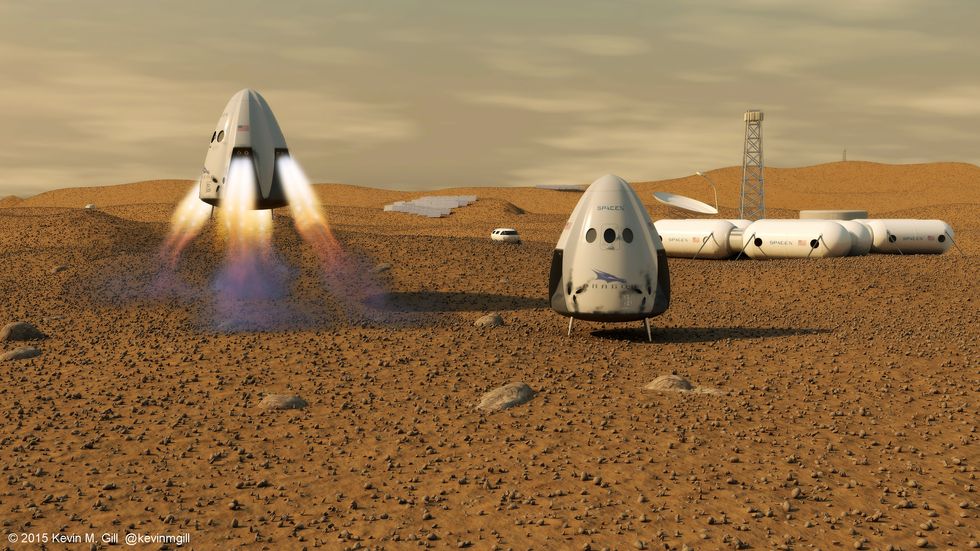"Yet even if birth control were to win through some fine day, even if cultivatable areas were enlarged and harvest multiplied by aids as yet unknown...it would all be only a postponement...I am convinced that one day men will settle on Mars...We must bequeath our grandchildren a chance to survive." - Erich Von Däniken
The quote above is an excerpt from Erich Von Däniken's 1968 bestseller, "Chariots of the Gods?", wherein a particular chapter he divulges in his reasons why he believes it is so permanent that mankind becomes a multi-planetary species. Although Von Däniken holds some rather eccentric notions on the origins of modern man in relation to the possible existence of alien intelligence, his idea, as is also the idea shared by many others, that the exhaustion of both man and his environment should be heeded both as a warning and a call to search for survival elsewhere in the universe.
Jordan Bates, an entrepreneur and autodidact philosopher, discusses what he refers to as 'the meaning of life from the perspective of the universe' in his article "Why Humanity Must Become a Multi-Planetary Species." In it, he grasps onto the philosophy of late astrophysicist, Carl Sagan, in which mankind, potentially being the only known conscience intelligence in the universe, is the means in which the universe can know itself. With this understanding, Bates supposes that our conscientiousness may, therefore, be interpreted as the conscientiousness of the entire universe and that our desire to maintain our evolution may be the desire of the universe as well. So as far as Bates' thesis goes, if we can assume that the universe wants humanity to continue down its evolutionary track (i.e., continue to existence), then we better take every precaution to ensure it.
What does this mean exactly? In short, Bates seeks to lay down a moral premise as to why mankind owes it to himself to search for means of survival separate from the world we already live in. Elon Musk, the man who seems to be making both Bates' and Von Däniken's dreams a soon reality, believes as much:
"I think there is a strong humanitarian argument for making life multi-planetary, in order to safeguard the existence of humanity in the event that something catastrophic were to happen..."
There are many ways in which mankind could meet his end. One is of the unpredictable nature like the sudden impact of a giant asteroid or solar flare. The other is of a human nature. No one can ignore that within the last century we have become fairly keen in the potentiality of our own self-destruction in the form of atomic weaponry. And as we can still see in our brief history on this planet, we're still more or less a savage child-race in which an outcome of nuclear annihilation is not necessarily off the table.
We also live with an unfortunate disproportion where the resources of the world are being dramatically fatigued to satisfy an ever-growing global population. To harken back to Von Däniken's quote above, the growing population of the world will continue without substantial food and medicine and will ultimately result in disease and starvation. If nothing can be done to calm this growing disproportion on Earth, then perhaps Von Däniken's proposal that we expand to the Red Planet is the best way to cope with a world whose own resources may only satisfy mankind for another century.
There are objections of course. The most notable one put forth is the question of why one would place so much investment in interplanetary space travel and not towards directly solving the problems of underdeveloped societies directly. Both Bates and Von Däniken put forward an idea on longevity. Though they both believe that focusing on the issues facing the human condition of the here and now are important, if we are to ensure a long-term goal for the survival and well being of the human race, then expanding beyond our borders is the only way to succeed. Essentially, they believe that it is as important to plan mankind's future in the coming millennia as it is in the coming century. As Bates puts it:
"Earth's challenges/issues won't matter if the entire human race or earthly biosphere is destroyed."
So whats the takeaway? It's an understanding of our present condition. According to physics, the universe, including our planet, is breaking down into entropy. And many of the enterprises that man has sought on Earth have, for the most part, accelerated the process until eventually, our planet will no longer have the means to support our needs for survival. If we value the longevity of mankind and his evolution, then we must, at some point or another, seek opportunity elsewhere among the stars.

















